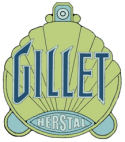



1919: 300cc De Luxe two-stroke single, belt drive, developed by Fernand Laguesse
1920s
1920: 750cc V-twin MAG
1922: 1000cc V-twin MAG
1922: 350cc two-stroke-engine size increased and fitted with chain drive
1925-1926: 350cc Sport Raid Bruxelles-Congo
1926: 350cc Tour du Monde introduced, named for Robert Sexe.
1926-1930: 500cc Super Sports (SS)
1926-1928: 500cc Sport
1928-1929: 500 cc bevel-drive racers introduced.
1929-1933 Geco-Herstal
1930s
1930: 500cc SV, 400cc SV, 350cc OHV models introduced.
1931: Small two-strokes introduced due Depression
1931-1933 350 Luxe
1931-1934 Tour du Monde
1932: 100cc and 175cc two-strokes offered.
1932-1933 350 Super Sport
1932 500cc Touriste SV
1932-1933 500cc Competition
1932-1933 500cc Coupe de France
1933-1935: 125cc two-stroke.
1933 Moto Legere
1933 350 Competition
1933 100cc
1933 125cc
1933 500cc Touriste OHV
1934 500cc Racing
1934 600 Competition
1934 600 OHV
1934 600 SV
1934 BMA
1935 Luxe SV 350cc
1935 Competition OHV 500cc
1936 500cc HG 25
1936 100cc BMA two-stroke, 2 exhaust ports
1936 Super Sport
1937-1942: 350cc Sport
1937-1944: 500cc Bol d'Or Mk 2
1937-1949: 720cc Military
1938 HG1 BMA 98cc 2T
1938 HG12 350cc 350cc
1938 HG14 350cc 350cc
1938 HG15 400cc SV SV 350cc
1938 HG16 500cc SV SV 500cc
1938 HG2 98cc 2T BMA BMA 98cc 2T
1938 HG20 350cc OHV 350cc OHV
1938 HG21 350cc OHV
1938 HG22 350cc OHV 500cc OHV
1938 HG24 500cc OHV
1938 HG5 98cc 2T
1938 HG4 90cc 2T 98cc 2T
1938 HG25 500cc OHV 500cc OHV
1938 HG26 500cc 500cc OHV
1938 HG27 600cc OHV
1938 HG28 600cc OHV 600cc OHV
1938 HG9 175cc 2T
1938 HG8 125cc 2T
1938 HG50 500cc SV
1938 HG55 500cc OHV
1938 HG56 600cc OHV
1938 HG60 600cc SV
1938 HG65 600cc OHV
1938 HG66 600cc OHV
1939 HG12 350cc
1939 HG1 BMA
1939 HG14 350cc
1939 HG15 400cc SV
1939 HG25 500cc OHV
1939 HG26 500cc
1939 HG27 600cc OHV
1939 HG4 90cc 2T
1939 HG5 98cc 2T
1939 HG28 600cc OHV
1939 HG8 125cc 2T
1939 HG9 175cc 2T
1939 HG16 500cc SV
1939 HG17 600cc SV
1939 HG2 98cc 2T BMA BMA
1939 HG20 350cc OHV
1939 HG22 350cc OHV
1939 HG24 500cc OHV
1940s
1940-1945: limited production.
1946: 250cc Superconfort twin along with several new models introduced, all with telescopic forks.
1947-1954: 250cc Superconfort
1949: 400cc and 500cc OHV and-SV new and revised models.
1949-1951: 500cc Superconfort
1949 Sport
1949 Touriste
1950s
1950 400cc
1950 500cc
1950 Superconfort
1950 Sport
1950 Touriste
1951 400cc Military
1951 500cc Sidevalve 500L AB Military
1951 Touriste
1951 Sport
1951 Legere
1951 BMA 100cc
1951 BMA 125
1951 500cc
1951 400cc
1952: 300cc Superconfort fourstroke.
1951-1955: 500cc Type C, 400cc OHV
1952: Military model Relay 400cc OHV and 500cc SV
1953: 350 cc Four-stroke Superconfort. Other new models 175cc and 250cc.
1953-1959: 300cc Milan (also possibly a 250cc model)
1953 400cc
1953 100cc
1953 150cc
1953 500cc OHV
1953 500cc SV
1954 175cc model increased to 200cc
1954-1958: 250cc Belgica (presented at the 1954 Brussels Motor Show)
1954 500cc SV
1954 400cc
1954 100cc
1954 500cc OHV
1954 125
1954 150cc
1954 250cc (4t)
1954 250cc (2t)
1955: FN, Sarolea and Gillet-Herstal begin to amalgamate.
1955 400 Super Confort
1955 500cc Super Confort
1955 250cc Milan 2T
1955 250cc Super Confort
1955 300cc Milan 4T
1956: 50cc Royal Nord-powered models appear. Legia 175, 200 and 250cc models, Belgica 200 and 250cc, Belgica Special 500 cc, Milan 250cc and 300cc
1956-1957 300cc
1956-1957 300cc Carenee
1956-1957 300cc Milan
1956-1957 250cc Milan OHV
1956-1957 250cc (2t)
1956-1957 250cc (4t)
1956-1957 250cc Belgica
1956-1957 250cc Carenee
1958: Production of Gillet-Herstal ends
1958-1960 250cc (2t)
1958-1960 250cc 2T Belgica
1958-1960 250cc (4t)
1958-1960 250cc Carenee OHV
1958-1960 250cc Milan OHV
1958-1960 250cc Belgora 2T
1958-1960 300cc OHV Carenee
1958-1960 300cc OHV Milan
1959-1960: Gillet-Herstal machines are built by Sarolea using remaining components.